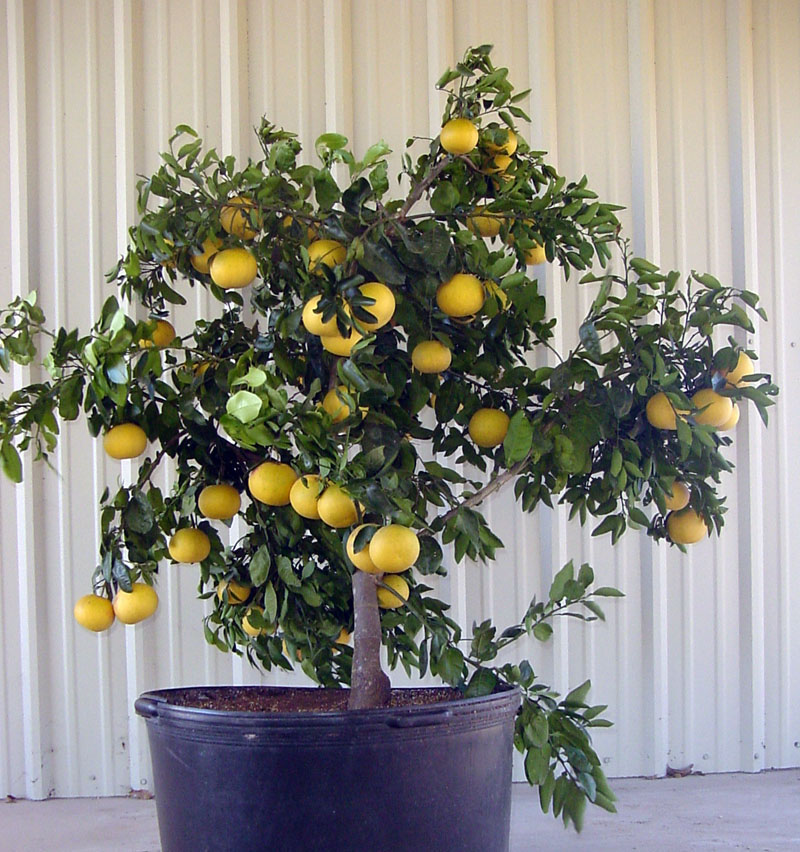Can Lemon Trees Grow in Virginia
There are many types of citrus trees that can be grown in Virginia, including lemon trees. Lemons are a popular choice for home growers because they are relatively easy to care for and produce a high yield of fruit. Lemon trees need full sun and well-drained soil to thrive.
They should be fertilized regularly with an acidic fertilizer to promote healthy growth. While lemon trees can withstand some cold weather, they will not tolerate freezing temperatures. If you live in an area where the temperature dips below 32 degrees Fahrenheit in the winter, it is best to grow your lemon tree in a container that can be moved indoors when necessary.
With proper care, your lemon tree will provide you with fresh lemons for years to come!
Lemon trees are a beautiful addition to any home, and they can thrive in Virginia with the right care. Lemons need full sun and well-drained soil to grow well. They are also sensitive to cold weather, so it’s important to choose a variety that is suited for Virginia’s climate.
Meyer lemons are a good option for Virginia gardeners.
Meyer lemons are smaller and rounder than traditional lemons, with a thin skin that is deep yellow when ripe. The flesh is also sweeter than other lemon varieties.
Meyer lemon trees are more cold-tolerant than other lemon varieties, making them a good choice for Virginia gardeners.
To plant a Meyer lemon tree, choose an area of your yard that gets full sun for at least six hours per day. Prepare the planting area by loosening the soil and adding compost or organic matter.
Dig a hole that is twice as wide as the root ball of your tree. Gently remove the tree from its container and place it in the hole so that the roots are spread out evenly. Backfill the hole with soil and water deeply to settle the roots into place.
Once your tree is planted, give it regular waterings during dry spells but allow the top inch of soil to dry out between watering sessions. Fertilize your lemon tree every spring with an organic fertilizer formulated for citrus trees.

Credit: fairfaxgardening.org
Will Citrus Trees Grow in Virginia?
Citrus trees are not native to Virginia, and they will not grow well in the state’s climate. Citrus trees require a warm, frost-free climate with ample sunshine and humidity. They also need well-drained soils that are high in organic matter.
In Virginia, winters are too cold for citrus trees to survive, and summers are often humid but lack the consistent warmth needed for these plants to thrive. Additionally, most of the state’s soils are heavy clay soils that retain too much moisture for citrus trees. For these reasons, it is best to avoid planting citrus trees in Virginia.
Is Lemon Tree Can Survive in Winter?
Most lemon trees will not survive in winter if left outdoors. They need to be brought indoors or placed in a protected area when the temperature starts to drop. Lemon trees can tolerate some cold, but they are not frost hardy.
If the temperature dips below freezing, the tree will likely die. Some people try to overwinter their lemon tree by placing it in a garage or shed, but this is not ideal as these areas are often too dry for the tree. The best way to overwinter a lemon tree is to bring it indoors and keep it in a bright room with temperatures that stay above freezing.
What Fruit Grows Best in Virginia?
Virginia is home to a wide variety of fruit trees and plants. Many different types of berries, grapes, apples, peaches, plums, and cherries grow well in the state. In addition, Virginia also has a thriving citrus industry with oranges, lemons, and grapefruits being produced in large quantities.
The climate in Virginia is generally conducive to growing fruit. The state has warm summers and cool winters which allow most fruit trees and plants to flourish. However, there are some areas of the state that are better suited for certain types of fruit than others.
For example, the Shenandoah Valley region is known for its apple production. This area has the perfect mix of elevation, rainfall, and temperatures for growing apples. As a result, many different types of apples thrive in this region including Red Delicious, Granny Smiths, Honeycrisps, and more.
If you’re looking to grow citrus fruits in Virginia then you’ll have the best luck in the southeastern part of the state. This area experiences less cold weather than other parts of Virginia which makes it ideal for growing oranges, lemons, grapefruits, and other citrus fruits.
Overall, Virginia is a great place to grow fruit thanks to its diverse climate and soil conditions.
What States Can You Grow a Lemon Tree In?
In the United States, lemon trees can be successfully grown in USDA hardiness zones 9-11. This means that they will do best in areas with warm, humid summers and mild winters. The tree will not tolerate freezing temperatures for extended periods of time.
Some good locations for growing lemon trees include California, Florida, Texas, Hawaii and Arizona.
Growing Citrus in Virginia
What Fruit Trees Can Grow in Virginia
When it comes to fruit trees, Virginia is a state with a diverse range of options. Whether you’re looking for an apple tree, peach tree, or something else entirely, you can find a variety of fruit trees that will do well in the Old Dominion State. Here are just a few examples:
Apple Trees: There are dozens of different types of apples that will grow well in Virginia. Some popular varieties include Golden Delicious, Granny Smith, and Jonathan Apples.
Peach Trees: If you’re looking for a peach tree that will produce delicious fruit, look no further than the Red Haven Peach Tree.
This variety is known for its sweet peaches that are perfect for canning or eating fresh off the tree.
Cherry Trees: Sweet cherries are another type of fruit that does well in Virginia. The Bing Cherry Tree is a popular option that produces large, dark red cherries that are perfect for pies and other desserts.
Can Lemon Trees Grow in Virginia Beach
Lemon trees are one of the most popular citrus trees to grow in home gardens. They are relatively easy to care for and provide a bounty of juicy, tart lemons that can be used in cooking or made into refreshing lemonade. While lemon trees will grow in many parts of the country, including Virginia Beach, they do require some special care to ensure a healthy crop of fruit.
Lemon trees need full sun to produce lots of lemons, so choose a spot in your yard that gets at least 8 hours of direct sunlight each day. The soil should be well-drained and rich in organic matter. Add compost or manure to the planting hole before setting your tree in it.
Water your tree deeply once a week, allowing the water to soak down to the roots. Mulch around the tree with straw or bark chips to help keep the roots cool and moist.
Fertilize your lemon tree monthly with an all-purpose fertilizer that has been diluted by half.
During the summer months, you may also need to spray your tree with fungicide every few weeks to prevent diseases such as powdery mildew from developing on the leaves and fruit.
Lemons ripen from late spring through early fall, so you can expect a bountiful harvest if you take good care of your tree. Enjoy fresh lemons all season long by adding them to salads, fish dishes, cocktails, desserts, and more!
Are Lemon Trees Hardy
Lemon trees are a type of citrus tree, and as such, they are tropical plants. In their natural habitat, lemon trees grow in hot, humid climates with plenty of rainfall. However, these conditions are not always possible to recreate in our homes and gardens.
As a result, many people wonder whether lemon trees are hardy enough to withstand colder temperatures and less than ideal growing conditions.
The good news is that lemon trees can be quite resilient and adaptable to different environments. While they may not produce as much fruit in cooler climates, it is still possible to grow healthy lemon trees in areas that experience cold winters.
With proper care and attention, your lemon tree can thrive for many years to come!
Meyer Lemon Tree
Meyer lemon trees are a dwarf citrus tree that is popular for its small size and easy care requirements. The Meyer lemon is a cross between a true lemon and either an orange or a mandarin. Meyer lemons are named after Frank N. Meyer, who introduced the tree to the United States in 1908.
Meyer lemons are smaller and more round than true lemons, with smooth, thin skin that is deep yellow when ripe. The flesh of Meyer lemons is also yellower than that of true lemons and has a sweeter, less tart flavor.
Meyer lemon trees can be grown outdoors in USDA hardiness zones 9-11, or indoors as houseplants in colder climates.
They prefer full sun but will tolerate some partial shade. These trees need well-drained soil and should be watered regularly during the growing season (spring through fall). Fertilize monthly with a balanced citrus fertilizer during the active growth period.
Allow the soil to dry out slightly between waterings to avoid root rot.
Meyer lemon trees are relatively disease-resistant, but they can be susceptible to pests such as scale, mealybugs, and aphids. Watch for these pests and treat them promptly if found.
Conclusion
Lemon trees are a popular citrus tree to grow in the home landscape, and they can be successfully grown in Virginia. The key to growing lemon trees in Virginia is to choose a variety that is suited for the climate. While there are many varieties of lemon trees, only certain ones will thrive in the humid summers and cold winters of Virginia.
Citrus trees need full sun to produce fruit, so make sure to plant your tree in an area that gets at least six hours of direct sunlight each day. Lemon trees also require well-drained soil, so be sure to amend your planting site with organic matter before planting. Water your tree regularly, especially during dry periods, and fertilize monthly with an all-purpose fertilizer.
With proper care, your lemon tree will provide you with delicious lemons for years to come!

